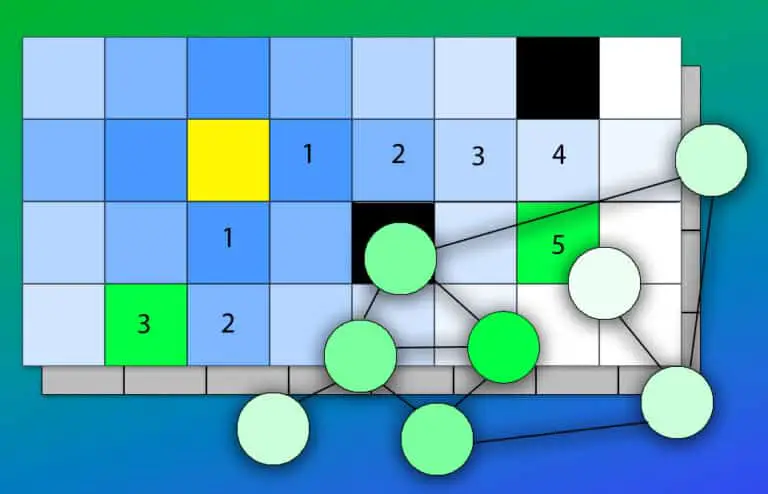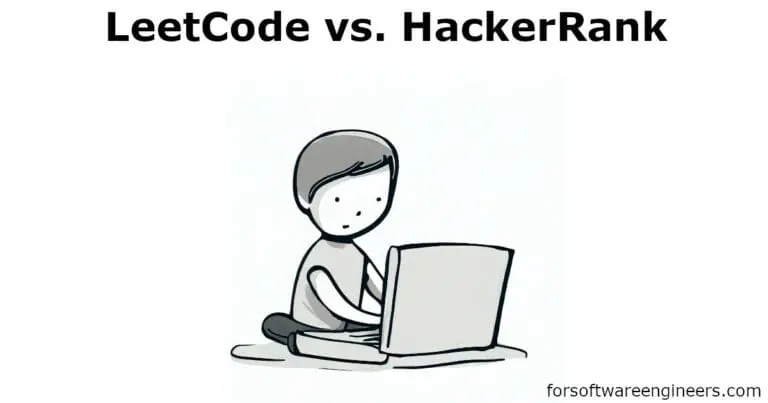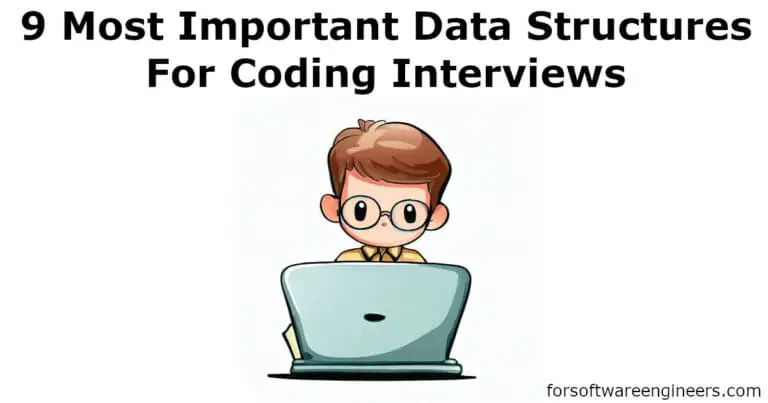How Should You Communicate During A Coding Interview?
Communicating during a coding interview means organizing and verbalizing your thoughts throughout the duration of a technical interview to your interviewer. Proficiently communicating during a coding interview will improve your overall evaluation as a software engineering candidate for interviews through the communication, analytical, and technical dimensions of the rubric. This is why it is important to have a strategy for how to communicate during a coding interview.

In this article, we will discuss 8 tips for communicating during an interview. The 8 tips are to communicate your understandings and assumptions, verbalize your thought process, ask your interviewer if what you’re saying makes sense, prompt your interviewer for feedback, explain the reason behind every programming line, elaborate on the tradeoffs you’re making, speak about time and space complexity, and talk while using appropriate technical language.

For each of the 8 tips, we will explain a definition of the tip and why the tip is essential for communicating during a software engineer technical interview.
1. Communicate Your Understandings And Assumptions
To communicate your understanding and assumptions means ensuring that you and your interviewer are thinking about the coding interview problem you’re working on in the same way. This is important for the technical interview because it helps express your strengths in understanding a problem, prerequisite knowledge, and reasonable inference of problem bounds to your interviewer.
While you’re communicating your understanding and assumptions of an interview problem, your interviewer will also have the opportunity to correct you on any incorrect assumptions you may have. This is a good thing because it helps align you towards a correct solution for the correct problem instead of a correct solution to an incorrect problem.
2. Verbalize Your Thought Process
Verbalizing your thought process means articulating organized thoughts of what you’re thinking in terms of solving a coding interview problem. Verbalization of your thought process is an important aspect of communication during a technical interview because a significant portion of your technical interview evaluation is based on your analytical ability, and the only way your interviewer can accurately gauge your analytical ability during a coding interview is through the communication of your thought process.
3. Ask Your Interviewer If What You’re Saying Makes Sense
Asking your interviewer if what you’re saying makes sense means ensuring that you both (or everyone in the case of a panel interview) understand each other in terms of the words that are said. Certain phrases, word choices, and terminology mean different things to different people.
That’s why it’s important to communicate with your interviewer(s) to ensure that what you’re saying is making sense. Otherwise, you decrease the probability of getting lower evaluation scores because your interviewer is unable to understand you, even if you know you’re right in your mind.
4. Prompt Your Interviewer For Feedback
Prompting your interview for feedback means ensuring that you are responsive to your interviewer(s) direction. This does not mean that you should ask your interviewer for help on every aspect of your technical interview. Instead, it means that you could analyze, evaluate, and then prompt your interviewer for feedback on what you think the best option for your solutions is to take.
For instance, if you come up with 3 solutions to a coding interview problem. You should explain the pros and cons of each of the approaches to your interviewer and give a recommendation of which approach is the best. Once you do that, you’ll want to ask your interviewer if they think it’s a good solution to start implementing, before you start implementing it.
5. Explain The Reason Behind Every Programming Line
Explaining the reason behind every programming line means explaining to your interviewer why you’re writing every line of code throughout the duration of a coding interview. Many candidates skip doing this, allowing the interviewer(s) to assume why they’re writing the lines of code, but it’s important to explain each line of code to your interviewer because it allows them to obtain more positive signals for you as a candidate.
Explaining each line of code allows you to also express your analytical ability. For instance, if you’re writing a line to assign a variable, you can talk about topics such as the variable name, placement of the variable, the optimal data structure (or primitive) to represent a variable’s value, and the value constraints of a variable. Discussing aspects of a line of code in a verbose manner like this easily allows the interviewer to understand what you’re thinking and gives you better evaluations.
6. Elaborate On Tradeoffs You’re Making
To elaborate on the tradeoffs you’re making means to emphasize the time you’re spending communicating to your interviewer about the tradeoffs you’re making throughout the duration of a coding interview. Examples of when this is relevant during a technical interview include when you’re deciding on a solution to a coding problem, when you’re deciding how to represent data as data structures (or variables), when you’re deciding how to structure code, and when you’re trying to optimize code.
Assessing the tradeoffs you’re making is one of the most essential aspects of your evaluation as a candidate within a coding interview. This is why it is important to emphasize.
7. Speak About Time And Space Complexity
Speaking about time and space complexity (also referred to as “big O”) refers to talking about code solutions in terms of their time and space complexity to your interviewer. Understanding the time and space complexity of a solution is an important aspect of understanding the fundamentals of computer science which is screened for during the coding interview.
Talking about the topic of time and space complexity within your interview is a great way to get positive signals on multiple aspects of your evaluation as a candidate such as your critical thinking, communication, and solution-correctness.
8. Talk While Using Appropriate Technical Terminology
Talking while using appropriate technical terminology means making sure that you’re using all of the proper technological terms that are related to computer science and programming when you’re communicating with your interviewer. This provides your interviewer with the impression that you understand the fundamentals of computer science and it also disambiguates any potential misunderstandings if you’re communicating with formal words.
What Other Skills Are Needed To Ace A Coding Interview?
The other skills that are necessary to pass a coding interview, in addition to communication, include knowledge of data structures (i.e., strings, arrays, and lists), knowledge of algorithms (i.e., depth-first search and breadth-first search), and coding interview problem-solving skills.
These skills are learned through the strategies and resources to pass a coding interview.
What Are The Most Important Data Structures For Coding Interviews?
There are 9 most important data structures to study for coding interviews which include strings, arrays, hash tables, stacks, queues, linked lists, trees, heaps, and graphs.
Studying each of these data structures, understanding their use cases, and knowing how and when to apply them will improve your chances of passing the vast majority of coding interviews. These data structures are the 9 most important data structures to study for a coding interview because they’re the most common data structures that are used in optimal solutions for coding interview problems.
What Are The Most Important Algorithms For Coding Interviews?
The most important algorithms to study for a coding interview are insertion sort, depth-first search (DFS), breadth-first search (BFS), and binary search.
Many coding interview problems have optimal solutions related to these most important algorithms. However, to significantly improve your chances of passing coding interviews, you’ll want to study all 6 types of essential algorithms.
The 6 types of algorithms you should study for a technical interview include sort algorithms, searching algorithms, recursive algorithms, divide-and-conquer algorithms, tree traversal algorithms, graph algorithms, and sliding window algorithms.
How Do You Get Better At Solving Coding Interview Problems?
You can get better at solving coding interview problems by practicing as many relevant practice coding interview questions as you can. Doing as many relevant coding questions as you can increases your chances of passing a coding interview because it allows you to recognize more patterns within the questions that are asked within coding interviews.
What Resources Can You Use To Practice Interview Skills?
The best resources that you can use to practice interview skills include mock interview platforms like Pramp, books like Cracking the Coding Interview, and courses like AlgoExpert’s coding interview course.
How Useful Are Mock Interviews To Study For Interviews?
Mock interviews are very useful to study for coding interviews. Mock interviews provide you with an environment that is as similar to a real coding interview as possible, allowing you to become more prepared and comfortable with the flow of an actual technical interview.
There are many reputable both paid and free mock interview platforms that allow you to have mock interviews for software engineer coding interviews. Free mock coding interview platforms allow you to practice with your peers and paid mock coding interview platforms allow you to get mock interviews by industry professionals from companies like Google, Meta, Apple, and Netflix.
How Useful Are Books To Study For Interviews?
Books are very useful for studying for interviews, as long as you’re reading the top coding interview books like Cracking the Coding Interview or Elements of the Programming Interview.
How Useful Are Courses To Study For Interviews?
Courses are very useful for studying for interviews, as long as you’re taking reputable and high-quality coding interview courses like AlgoExpert’s coding interview course or Coursera’s Algorithms Specialization course by Stanford University.







